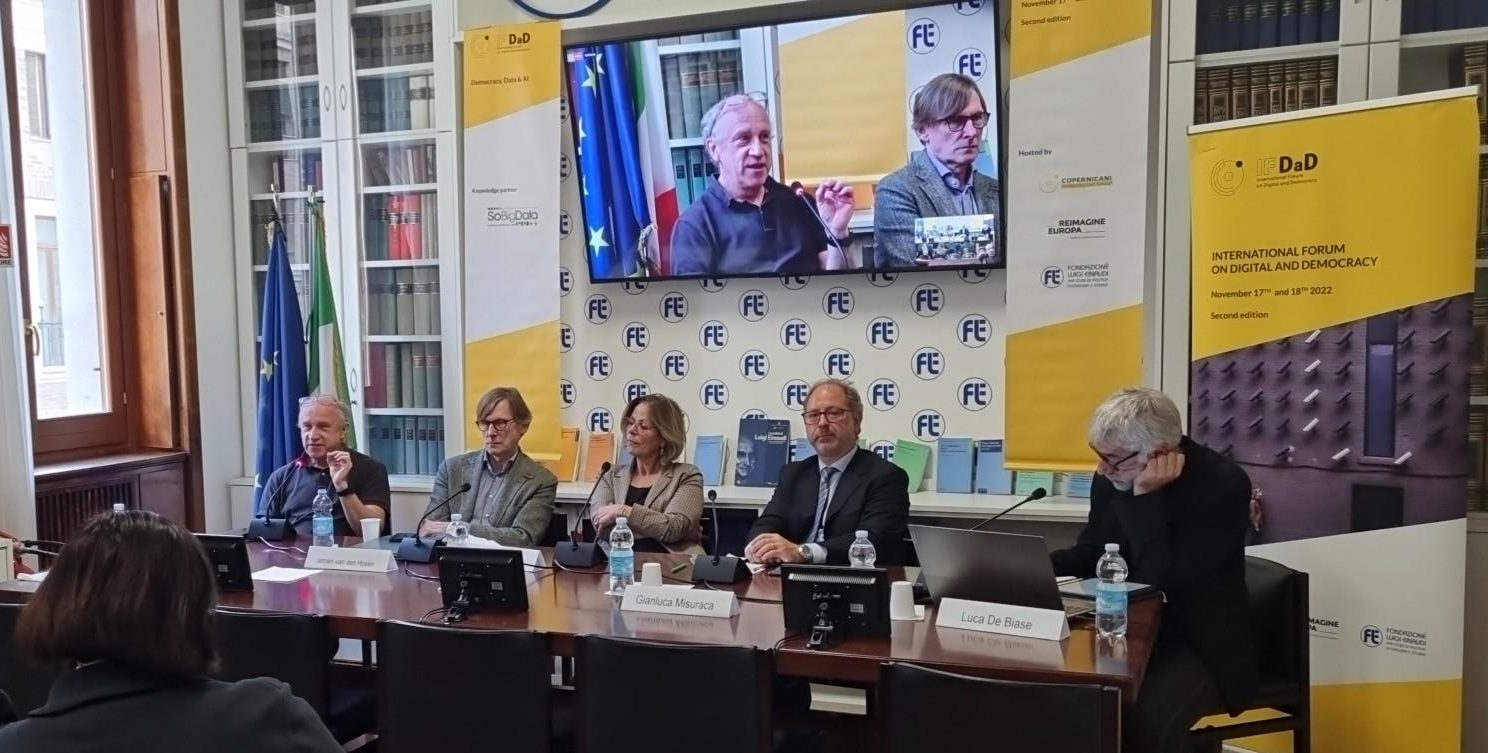How can we maintain a healthy media ecosystem in a digital world? How does disinformation spread through social media and what are the effects of this growing trend in all civic institutions? Can data governance and trustworthy Artificial Intelligence help strengthen our democracies?
Dozens of leading thinkers from academia, policy, and non-governmental organizations gathered in Rome for the second edition of the International Forum on Digital and Democracy (IFDaD) to discuss the complex relationship that exists between society and a rapidly digitalized communication ecosystem. Hundreds of citizens also joined online the hybrid event online, which was organized in close cooperation between Associazione Copernicani, Fondazione Luigi Einaudi, Re-Imagine Europa, and SoBigData++.
The IFDaD 2022 opened with a keynote address by Věra Jourová, European Vice-President for Values and Transparency, who reflected on the relationship between digital technologies, innovation, and the protection of democracy. Jourová stated that “When it comes to digital, technology shouldn’t be the main focus: people should be, and citizens must have a say in forming the way the digital works”. In a crucial moment, marked by the entry into force of the European Digital Services Act, Jourová said she doesn’t see any conflict between the European Commission and the digital platforms. “They may not like everything we are doing, but they understand that if they lose the trust of the users when it comes to privacy and safety, they will be losing money”. During a conversation with Mr Luca De Biase, Re-Imagine Europa’s Media Director, the European Commission’s Vice-President then added that “Europe is leading the world in putting together values and rules still respecting the innovative face of technology”.
The event also featured addresses by Romano Prodi, former President of the European Commission and co-founder of the IFDaD; Gabriela Ramos, Assistant Director-General for the Social and Human Sciences of UNESCO; Roberto Viola, Director-General for Communications Networks, Content and Technology at the European Commission, and Vincenzo Aquaro, Chief of Digital Government at the United Nations; as well as the participation of leading experts as Jeroen Van den Hoven, professor of Ethics and Technology at Delft University; Fosca Giannotti, Professor at Scuola Normale Superiore; Jeffrey Sachs, Director of the Center for Sustainable Development at Columbia University; Gianluca Misuraca, Co-Founder at Inspiring Futures; Gry Hasselbalch, Cofounder and Research Director of DataEthics.eu and Mathew Ingram, Chief Digital Writer at Columbia Journalism Review.
In conversation with Erika Staël von Holstein, Chief Executive at Re-Imagine Europa, UNESCO’s Assistant Director-General Gabriela Ramos expressed the need to educate young generations in humanities, ethics and philosophy, to be able to successfully navigate digital societies: “Of course, we should bet on mathematics and critical thinking for the future literacy of people towards AI, but ethical training is also utterly needed in schools.”, said Ms Ramos, who then added that “Without ethical guidance, the machines reproduce the inequality of the real world”, referring to UNESCO ‘s Recommendations on the Ethical of Artificial Intelligence.
Although many participants alerted about the dangers of disinformation spreading through social networks and the growing mistrust in all institutions (including traditional media), a majority of experts and policy-makers expressed their conviction that these menaces can be faced with solid regulation to guarantee citizen’s basic rights, and more human-centered technologies. As Mr De Biase claimed, “Although tech developers might have biases on specific topics, well-developed regulation could foster technology that is ethical-by-design”.
Creating a safer digital space where citizen’s fundamental rights are protected without impeding innovation, growth and competitiveness is precisely the aim of the new European Digital Services Act and the Digital Market Act, two regulations that will have a significant impact not only in the future development of digital markets but also in the defense of citizen’s fundamental rights.




